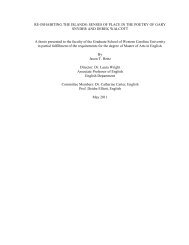SUMMERS, KAREN CRADY, Ph.D. Reading Incest - The University ...
SUMMERS, KAREN CRADY, Ph.D. Reading Incest - The University ...
SUMMERS, KAREN CRADY, Ph.D. Reading Incest - The University ...
You also want an ePaper? Increase the reach of your titles
YUMPU automatically turns print PDFs into web optimized ePapers that Google loves.
64<br />
conflicting demands of love and honor: Love that encourages a knight’s prowess<br />
and increases his honor is commendable; any excess of passion that hinders the<br />
knight’s quest for honor must be controlled by marriage. . . . Even more critical of<br />
the Round Table is the tale of the Sangreal, in which Malory upholds the<br />
traditional union of Christianity and chivalry and finds Lancelot, the best knight<br />
in the world, lacking in fortitude and stability. (208)<br />
Honor, then, is the appropriate path for a knight; similarly, the Confessio Amantis tales<br />
related by Genius exemplify the proper response of the king, i.e. humility as an answer to<br />
pride and charity as the answer to envy. Cherewatuk’s assessment addresses the same<br />
excess of passion shared by the characters in Gower’s tales.<br />
Helen Cooper finds that fifteenth-century romance often pursues “a fantasy of<br />
high chivalry that disguise[s] the moribundity of its underlying ideology” (143). In<br />
contrast to the fond remembrance of chivalry the way it used to be, contemporaneous<br />
events must certainly have shaken the beliefs of those who lived through them. <strong>The</strong><br />
Hundred Years’ War, which so concerned Gower, has been tagged as particularly<br />
ferocious war of a type previously unseen in England;<br />
the honest yeoman of Edward III's time had evolved into a professional soldier of<br />
fortune, and had been demoralized by the prolonged and dismal Hundred Years’<br />
War, at the close of which many thousands of ruffians, whose occupation had<br />
gone, had been let loose in England. At the same time the power of feudalism had<br />
become concentrated in the hands of a few great lords, who were wealthy enough<br />
and powerful enough to become king-makers. <strong>The</strong> disbanded mercenaries enlisted<br />
indifferently on either side, corrupting the ordinary feudal tenantry with the evil<br />
habits of the French wars, and pillaged the countryside, with accompaniments of<br />
murder and violence, wherever they went. (“Roses, Wars”)<br />
It may be that 15 th century Englishmen found similarities between their time and this<br />
earlier unsettled time. <strong>The</strong> Hundred Years’ War ended it 1453, but the Wars of the
















